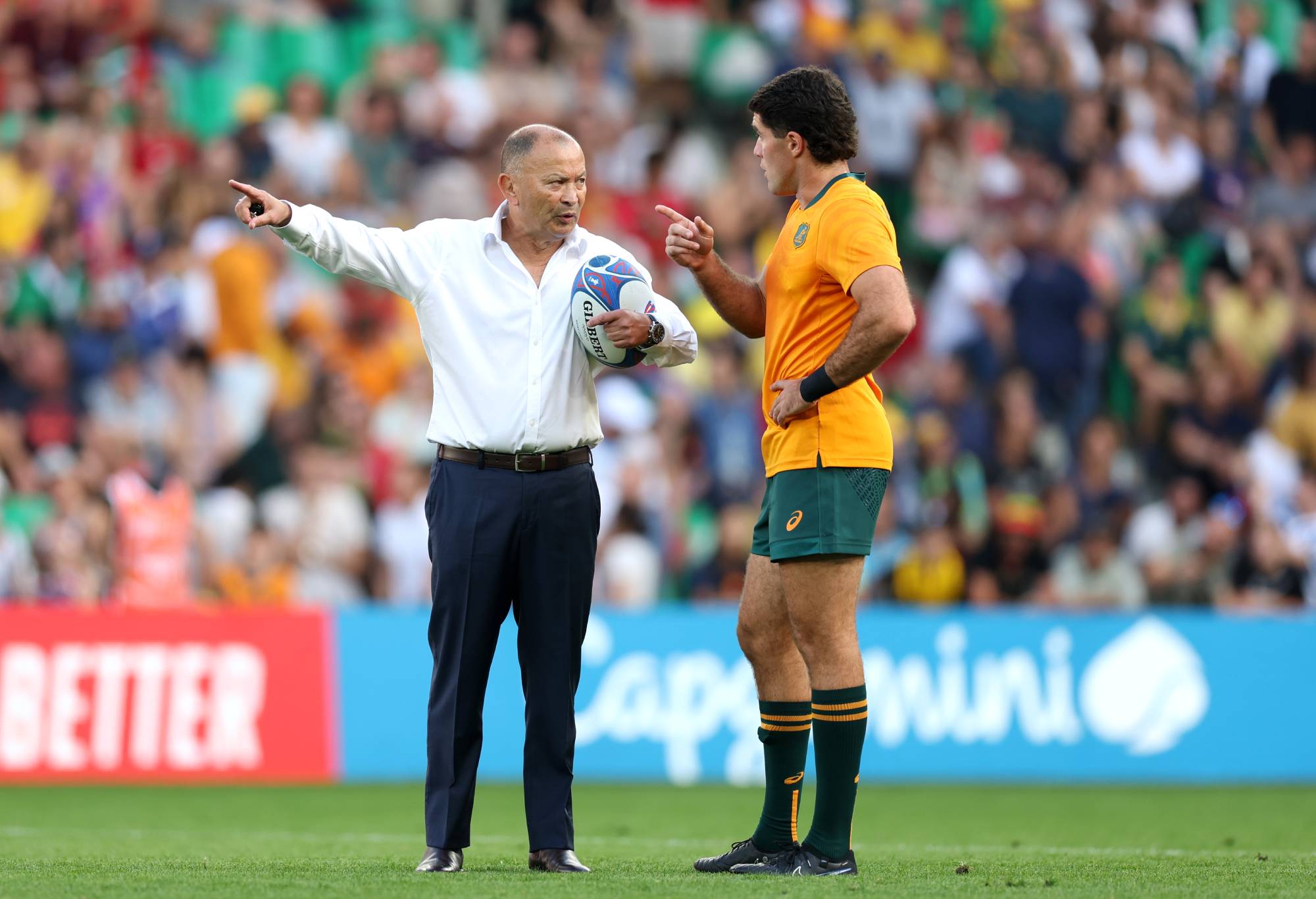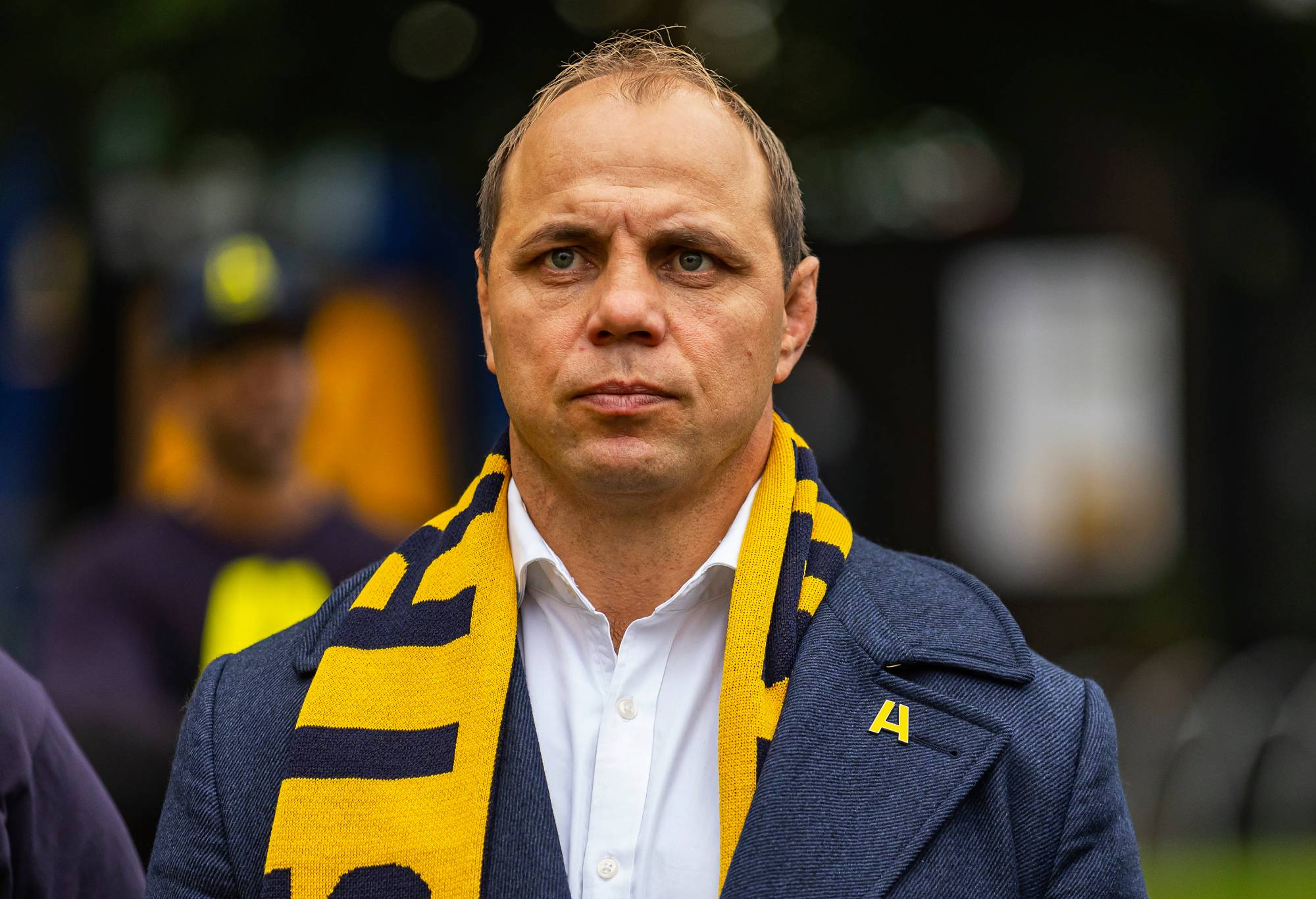Rugby Australia CEO Phil Waugh has revealed Eddie Jones’ disastrous World Cup campaign included millions of dollars in unapproved expenses.
“The over-investment that was unapproved was $2.6 million, which covered three main elements, being team costs, staff travel and then player benefits,” Waugh told reporters.
He was asked if he and then RA chairman Hamish McLennan were aware of the budget blow out while it was happening.
“A lot of that’s retrospective,” Waugh said.

Eddie Jones, Head Coach of Australia, speaks with Ben Donaldson of Australia prior to the Rugby World Cup France 2023 match between Australia and Portugal at Stade Geoffroy-Guichard on October 01, 2023 in Saint-Etienne, France. (Photo by Julian Finney – World Rugby/World Rugby via Getty Images)
“So a lot of that came through post-World Cup. Going into a World Cup you want to set the team up for success.
“I mean, the reality is that 86 per cent of our revenue comes through the men’s 15s program for Rugby Australia, and a successful World Cup program is critical to that.
“There was lenience given in the hope that we would succeed at the World Cup and make it deep into the tournament. Clearly that didn’t happen, but the circumstances were quite unique.”
Waugh did not directly blame Jones or his team manager Chris Webb, neither of who are still with the Wallabies, but said: “breaches in that area and we’ve made personnel changes on the back of some of those breaches.”
He said Super Rugby clubs had been made aware of the over-spend.
“The unapproved investment was disclosed to them at [a] summit with them on Monday,” Waugh said. “Clearly, that’s not acceptable and it won’t happen again going forward.”
RA earlier released 23 recommendations from the external review conducted into the Wallabies’ 2023 season, including the Rugby World Cup disaster.
A focus on team leadership and a “more transparent” selection procedure follows the chaotic mess of selections under Jones.
Since the World Cup, reports have emerged of poor communication to players who were left off the squad.
Waugh said a “big thing that came through was a lack of connectedness from the coaching staff right through to the newer players.
“That’s very much a thing to work on, that culture element and ensuring that connectedness.”
Waugh suggested that culture issues raised were confined to the 2023 season.
“What came through is culture and trust,” said Waugh. “Trust takes time. Clearly there’s been a breakdown in trust from leadership, the organisation and players.
“It’s my responsibility that the players are in the environment, that’s the right environment and world class and they want to be a part of. It came through that we didn’t create that environment for the players.”
The review, undertaken by a four-person panel incorporating former internationals Andrew Slack and Justin Harrison, as well as Darlene Harrison and Pasifika Advisor Moana Leilua, aims to help “build a stronger Wallabies program,” according to Waugh.
With 94 participants, the review outlined 23 recommendations for RA. In a statement RA said the governing body has lready begun addressing the key areas via restructuring of its High Performance department.
That includes the recruitment of Peter Horne as Director of High-Performance, David Nucifora as a High-Performance Advisor, and Joe Schmidt as Wallabies head coach within the new structure.
“Following the Rugby World Cup last year, we began to systematically apply structural and personnel changes to address a significant number of the improvement opportunities raised in the review,” said Waugh.
“Last season was a unique situation with a unique set of circumstances, and it was important for us to hold an external process to get a very detailed and honest evaluation from the stakeholders – especially the players.
“This will allow us to process the 2023 season and use it to build a stronger Wallabies program.
“We have been stressing the importance of an aligned and united Rugby ecosystem across all levels, and it is essential that the Wallabies lead the way – the Wallabies are an important team to Australia, with a long and storied history.

Rugby Australia Board Director and Classic Wallaby Phil Waugh looks on during a Rugby Australia media opportunity in support of the Rugby World Cup 2027 & 2029 bid, at Queensbridge Square on May 13, 2022 in Melbourne, Australia. (Photo by Daniel Pockett/Getty Images for Rugby Australia)
“I would like to thank each of the members of the review panel for their professionalism, thoroughness and sensitivity throughout this process – I am confident that this review will help draw a line in the sand as we strive to implement the processes and structures that will drive the Wallabies towards a successful future.”
The recommendations were grouped into five categories.
HP strategy
- Develop a national high-performance strategy with a focus on delivering an integrated model to optimise performance across Super Rugby and national teams.
- Create a High-Performance Advisory Group to access more HP expertise, and to complement the expertise within RA and its Board – RA will evaluate its existing Rugby Committee and identify opportunities to broaden its knowledge base.
- Develop a systematic review cycle for national teams including standardised methodology.
Agree set metrics for board and executive to conduct regular reviews to drive stronger accountability and transparency.
Wallabies and HP programs
- Reset the formal player leadership structure of the Wallabies.
- Implement a shared leadership model across players and coaches.
- Establish more clearly defined roles and responsibilities for coaching staff and team captain in selection process.
- Refine the team selection process to be more transparent for players.
- Development of cohesive training and program principles to establish more clarity for players.
- Employ an experienced S&C expert to lead physical preparation in collaboration with Super Rugby clubs.
- Consider optimisation of Wallabies HP support team; numbers, roles, competency and experience levels, integration into broader HP system with SR clubs.
- New Director of HP (Peter Horne) to manage stakeholder expectations and set clear priorities that are understood across HP system.
- Develop success profiles for Wallabies coaching team.
Culture
- Foster greater interaction between RA Board and national players, to build trust, promote transparency & improve culture.
- Investigate measures to build greater connection between players and leadership – and leverage to facilitate more cooperative behaviours, build group cohesion and trust.
- Create an environment that is built on trust with an emphasis on player and staff welfare.
- Design and embed a Wallabies Team Legacy with input from the playing group.
- Build cultural capability and embed culturally inclusive practices within the Wallabies environment and across the HP system.
Governance
- RA to undertake a governance review with regard to HP.
- Review of current HP practices and policies to ensure ‘fit-for-purpose’ policies and processes – i.e. safeguarding framework, duty of care charter, robust escalation/whistleblowing process.
- RA to review its HP recruitment, selection and transition processes.
National coaching program
- RA to consider development of a national HP and leadership strategy that prioritises development and acquisition of technical experts and Rugby leaders.
- Evaluate a customised national approach to leadership development across coaches, players, staff and executive.






























































































